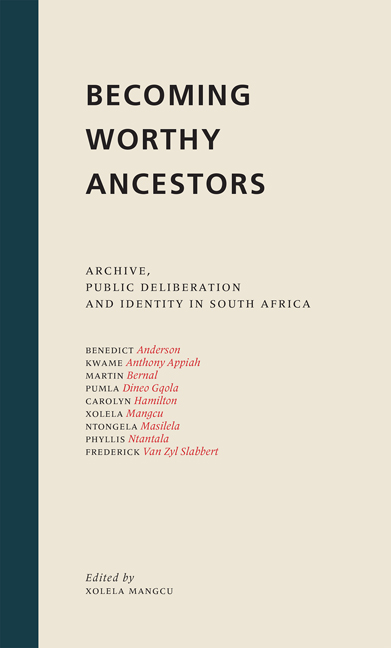Book contents
- Frontmatter
- Contents
- Preface
- Chapter One Evidentiary Genocide: Intersections of Race, Power and the Archive
- Chapter Two The Transmission Lines of the New African Movement
- Chapter Three Some Do Contest the Assertion That I Am An African
- Chapter Four Africa in Europe, Egypt in Greece
- Chapter Five Unconquered and Insubordinate: Embracing Black Feminist Intellectual Activist Legacies
- Chapter Six Identity, Politics and the Archive
- Chapter Seven The Goodness of Nations
- Chapter Eight Why Archive Matters: Archive, Public Deliberation and Citizenship
- Endnotes
- Index
Chapter Six - Identity, Politics and the Archive
Published online by Cambridge University Press: 21 March 2018
- Frontmatter
- Contents
- Preface
- Chapter One Evidentiary Genocide: Intersections of Race, Power and the Archive
- Chapter Two The Transmission Lines of the New African Movement
- Chapter Three Some Do Contest the Assertion That I Am An African
- Chapter Four Africa in Europe, Egypt in Greece
- Chapter Five Unconquered and Insubordinate: Embracing Black Feminist Intellectual Activist Legacies
- Chapter Six Identity, Politics and the Archive
- Chapter Seven The Goodness of Nations
- Chapter Eight Why Archive Matters: Archive, Public Deliberation and Citizenship
- Endnotes
- Index
Summary
ACCOUNTS OF IDENTITY
To make sense of what we now call ‘identity’ in our public and private lives, it helps to understand the central elements that all identities share, so let me begin by offering my own account of identity, which explains how identities work by talking about the labels for them. Take some identity-label (it doesn't matter which it is): South African, male, Catholic, lesbian, Swazi, Swede … everything I say here is meant to apply to all of them.
My story has four elements: ascription, identification, treatment and norms of identification. Let me now say a little more about each of these four elements, beginning with ascription. The criteria of ascription are the properties on the basis of which we sort people into those to whom we do, and those to whom we don't, ascribe an identity label. People will rarely agree on exactly which properties people of a certain identity must have. Are people of European ancestry really Zimbabwean? Are Muslims really French? One form of identity politics involves negotiation of the boundaries of various groups. If being a devout Muslim is inconsistent with being French, you might not be able to go to a state school with your hijab on. If being white is inconsistent with being Zimbabwean, then you might not get the vote.
Next: identification. When a person thinks of herself as, let us say, Swedish, in the relevant way, she identifies as Swedish. This means she sometimes feels like or acts as a Swede, and will sometimes respond affectively in a way that depends on that identity, may feel proud of a fellow national who has just won a race at the Olympics.
Now: treatment. Kindness is a common form of treatment directed towards fellow in-group members: Knut helping out his fellow Swedes. Unkindness is an equally frequent form of treatment directed towards out-group members. Here is room for politics, as people try to use the government to enforce their likes and dislikes. And the politics can be very serious: this is, after all, what apartheid was all about.
- Type
- Chapter
- Information
- Becoming Worthy AncestorsArchive, Public Deliberation and Identity in South Africa, pp. 89 - 108Publisher: Wits University PressPrint publication year: 2011



